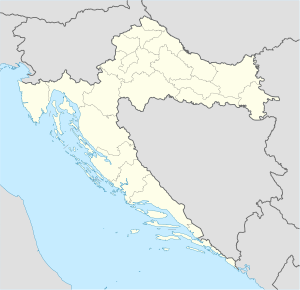Siege of Varaždin Barracks
| Siege of Varaždin Barracks | |||||||
|---|---|---|---|---|---|---|---|
| Part of the Battle of the Barracks | |||||||
|
Major barracks of the JNA 32nd Corps, 22 September 1991 |
|||||||
|
|||||||
| Belligerents | |||||||
|
|
|
||||||
| Commanders and leaders | |||||||
|
|
|
||||||
| Strength | |||||||
| 1,000–2,000 | approx. 1,000 | ||||||
| Casualties and losses | |||||||
| 2 killed, 24 wounded | 2 killed, 15 wounded approx. 1,000 captured |
||||||
| 2 civilians killed | |||||||
The Siege of Varaždin Barracks, also referred to locally as Varaždin's Days of War (Croatian: Varaždinski dani rata), was the blockade and capture of the Yugoslav People's Army (JNA) barracks and other facilities in and around the city of Varaždin during the Croatian War of Independence. The blockade began on 14 September 1991, quickly escalated into fighting, and ended on 22 September with the surrender of the JNA garrison. It was part of the Battle of the Barracks—an effort by Croatian armed forces to isolate JNA units based at barracks in Croatia, or capture the barracks to provide arms for Croatia's nascent army.
The besieging force outnumbered the JNA garrison in Varaždin, which was divided among several barracks, storage depots and other facilities, but the JNA possessed substantially greater firepower. The balance shifted in favour of the Croatian forces after smaller JNA posts were captured in the first few days of the siege, until only one barracks along with the headquarters of the JNA 32nd Corps remained under JNA control. At that point, the commander of the 32nd Corps, Major General Vladimir Trifunović, and the civilian authorities in Varaždin agreed that the remaining JNA forces in the city would surrender, but all those wishing to leave would be permitted to do so, leaving their weapons behind.
The capture of the 32nd Corps' weapons was the most significant achievement of the Battle of the Barracks, and greatly augmented the capabilities of the Croatian military. After he left Croatia, Trifunović was indicted for war crimes by Croatia, tried in absentia and convicted for the combat deaths of six Croatian soldiers and the wounding of dozens of Croatian citizens before and during the siege. He was also prosecuted by Yugoslav authorities for treason, but subsequently pardoned. In 2013, he requested a re-trial on his Croatian war crimes conviction, but died before proceedings could commence.
In 1990, ethnic tensions between Serbs and Croats worsened after the electoral defeat of the government of the Socialist Republic of Croatia by the Croatian Democratic Union (Croatian: Hrvatska demokratska zajednica – HDZ). The Yugoslav People's Army (Serbian: Jugoslovenska Narodna Armija – JNA) confiscated Croatia's Territorial Defence (Croatian: Teritorijalna obrana – TO) weapons to minimize resistance. On 17 August, the tensions escalated into an open revolt of the Croatian Serbs, centred on the predominantly Serb-populated areas of the Dalmatian hinterland around Knin (approximately 60 kilometres (37 miles) north-east of Split), parts of the Lika, Kordun, Banovina and eastern Croatia. In January 1991, Serbia, supported by Montenegro and Serbia's provinces of Vojvodina and Kosovo, unsuccessfully tried to obtain the Yugoslav Presidency's approval for a JNA operation to disarm Croatian security forces. The request was denied and a bloodless skirmish between Serb insurgents and Croatian special police in March prompted the JNA itself to ask the Federal Presidency to give it wartime authority and declare a state of emergency. Even though the request was backed by Serbia and its allies, the JNA request was refused on 15 March. Serbian President Slobodan Milošević, preferring a campaign to expand Serbia rather than to preserve Yugoslavia with Croatia as a federal unit, publicly threatened to replace the JNA with a Serbian army and declared that he no longer recognized the authority of the federal Presidency. The threat caused the JNA to abandon plans to preserve Yugoslavia in favour of expansion of Serbia as the JNA came under Milošević's control. By the end of March, the conflict had escalated with the first fatalities. In early April, leaders of the Serb revolt in Croatia declared their intention to amalgamate the areas under their control with Serbia. These were viewed by the Government of Croatia as breakaway regions.
...
Wikipedia

